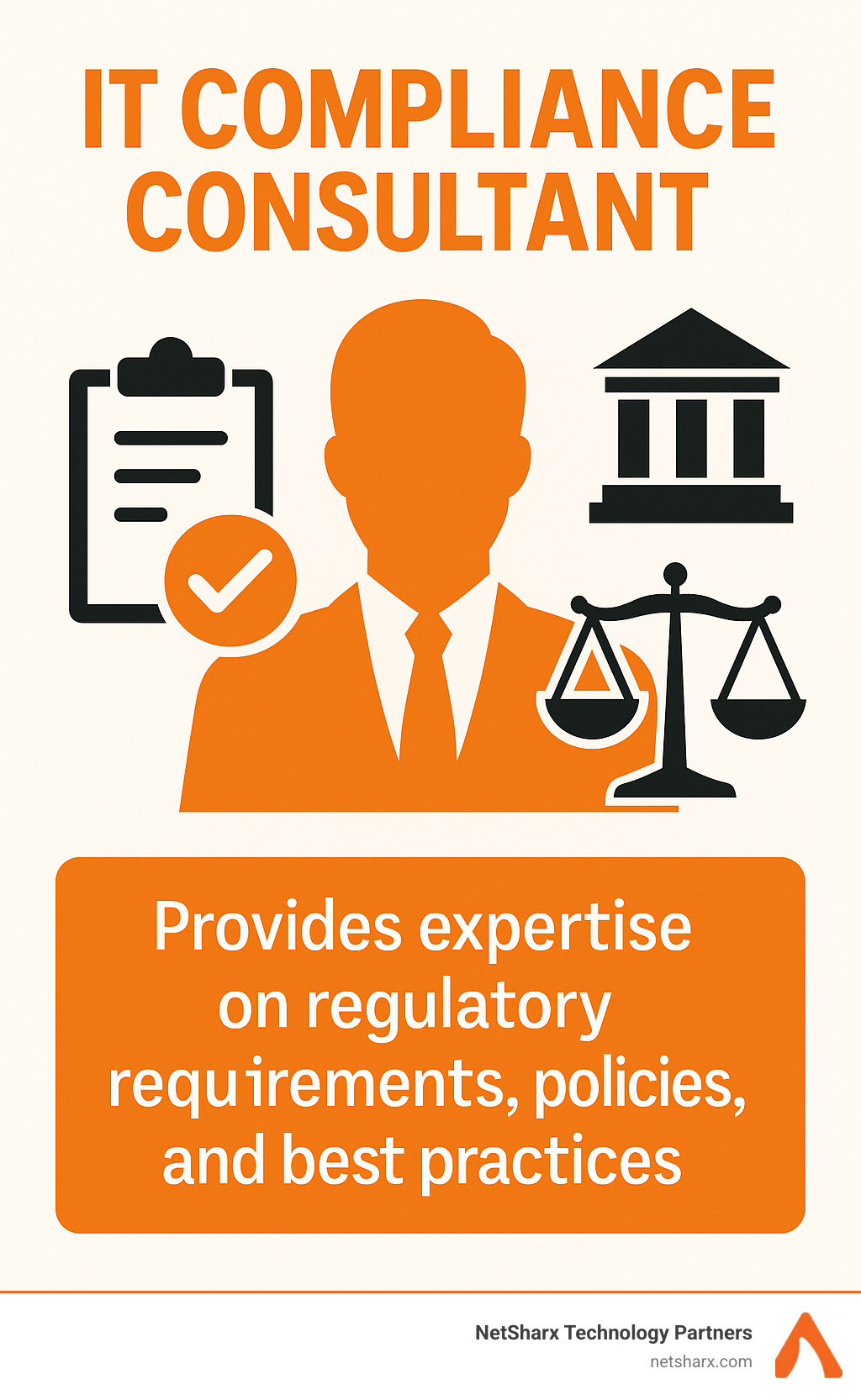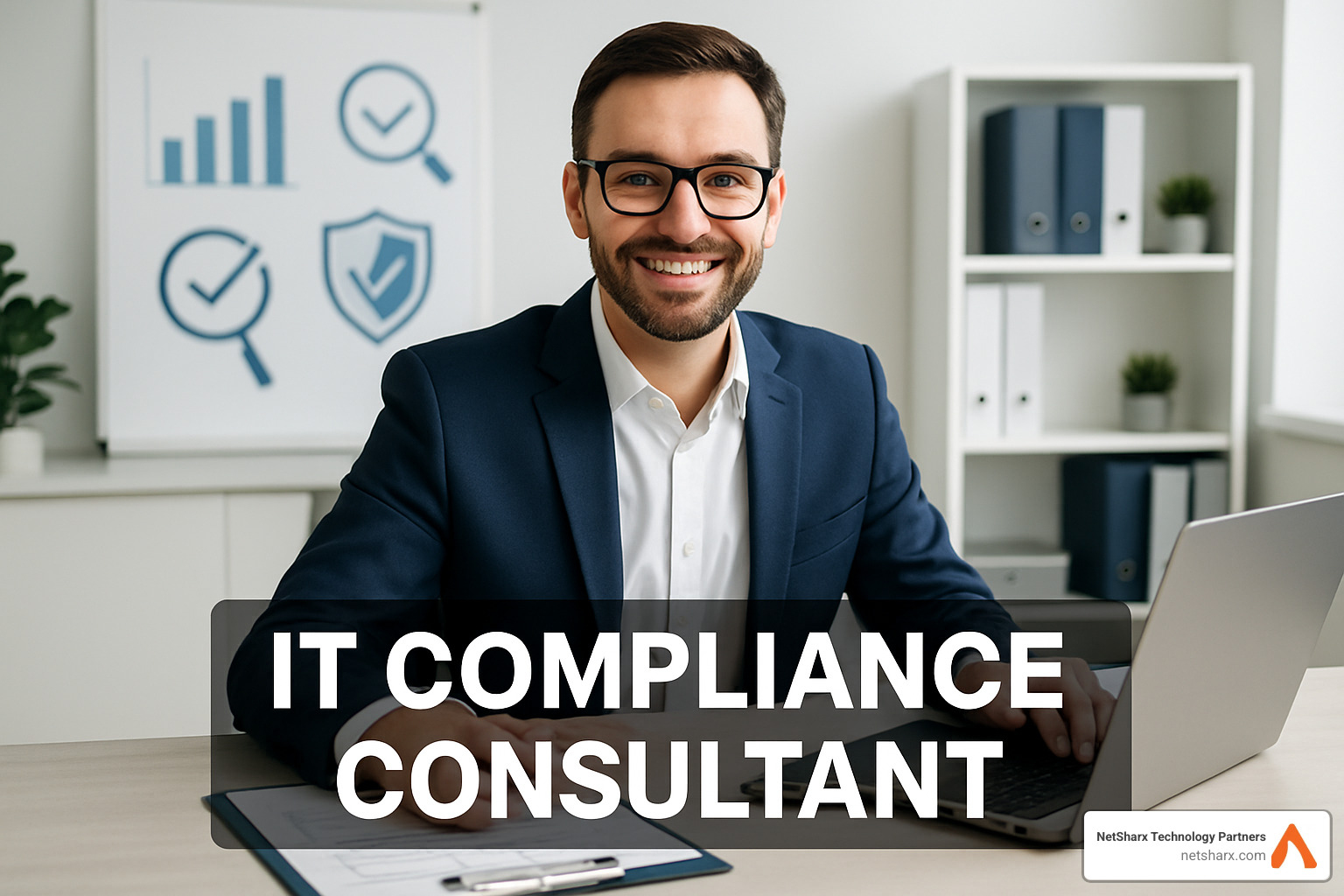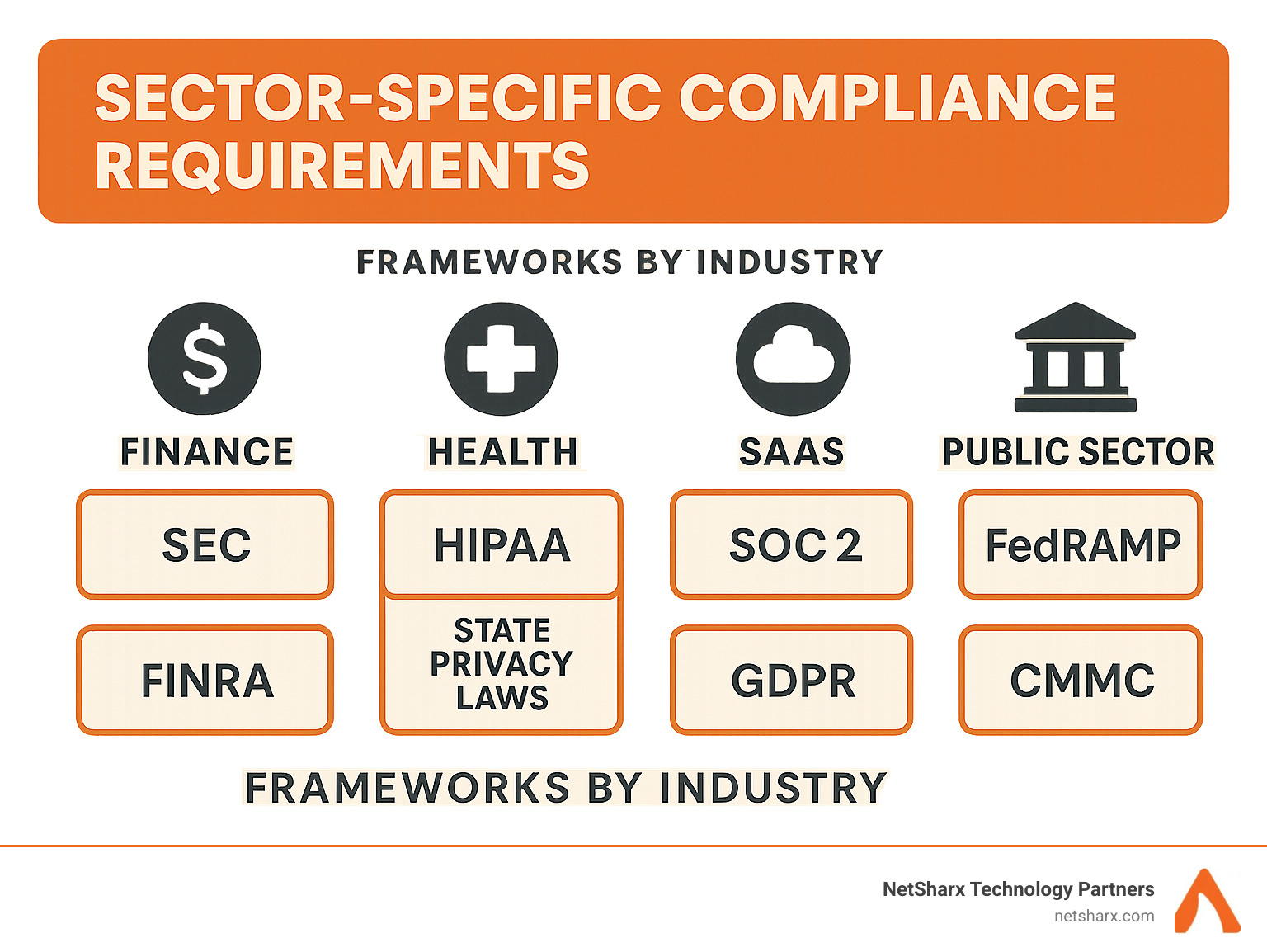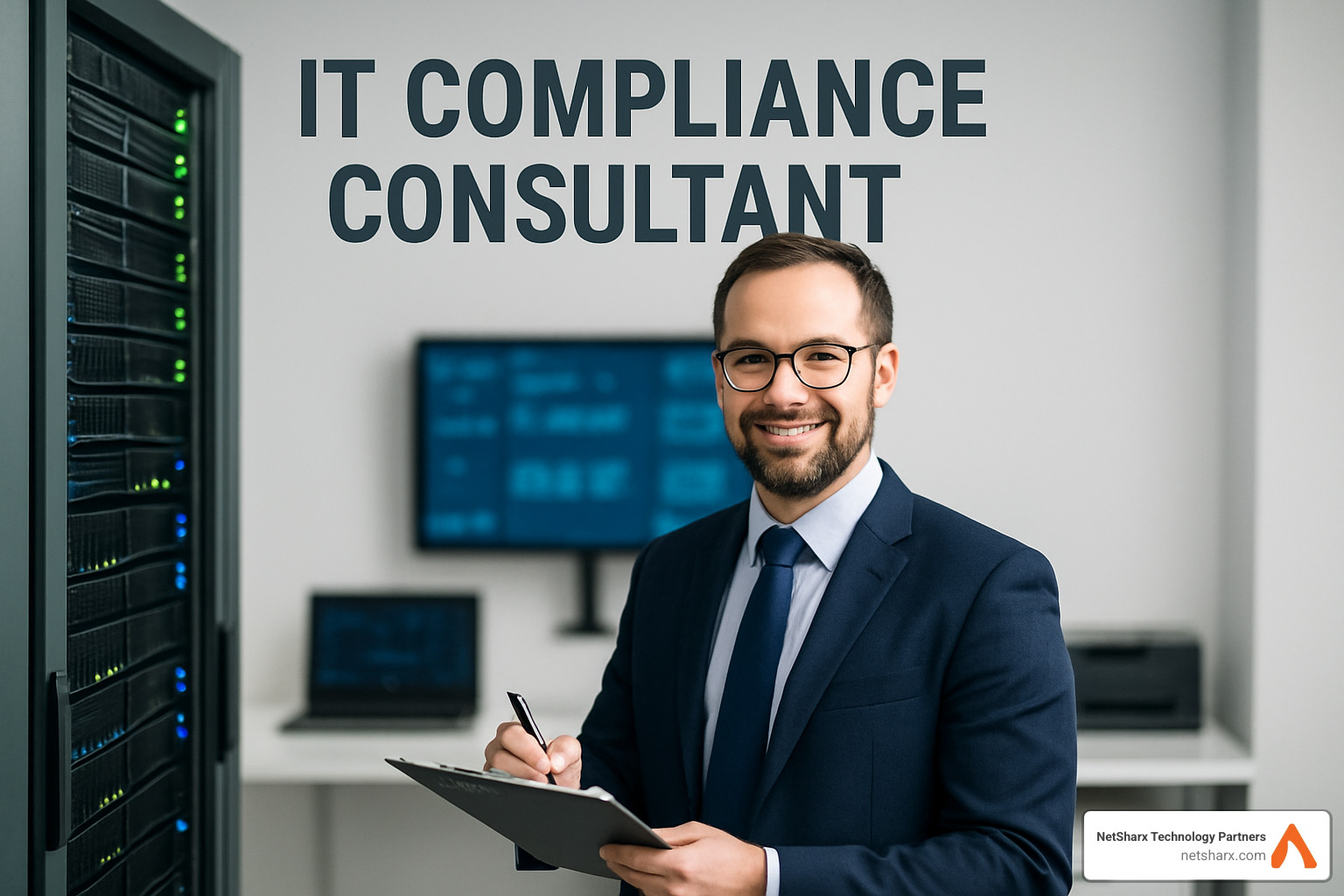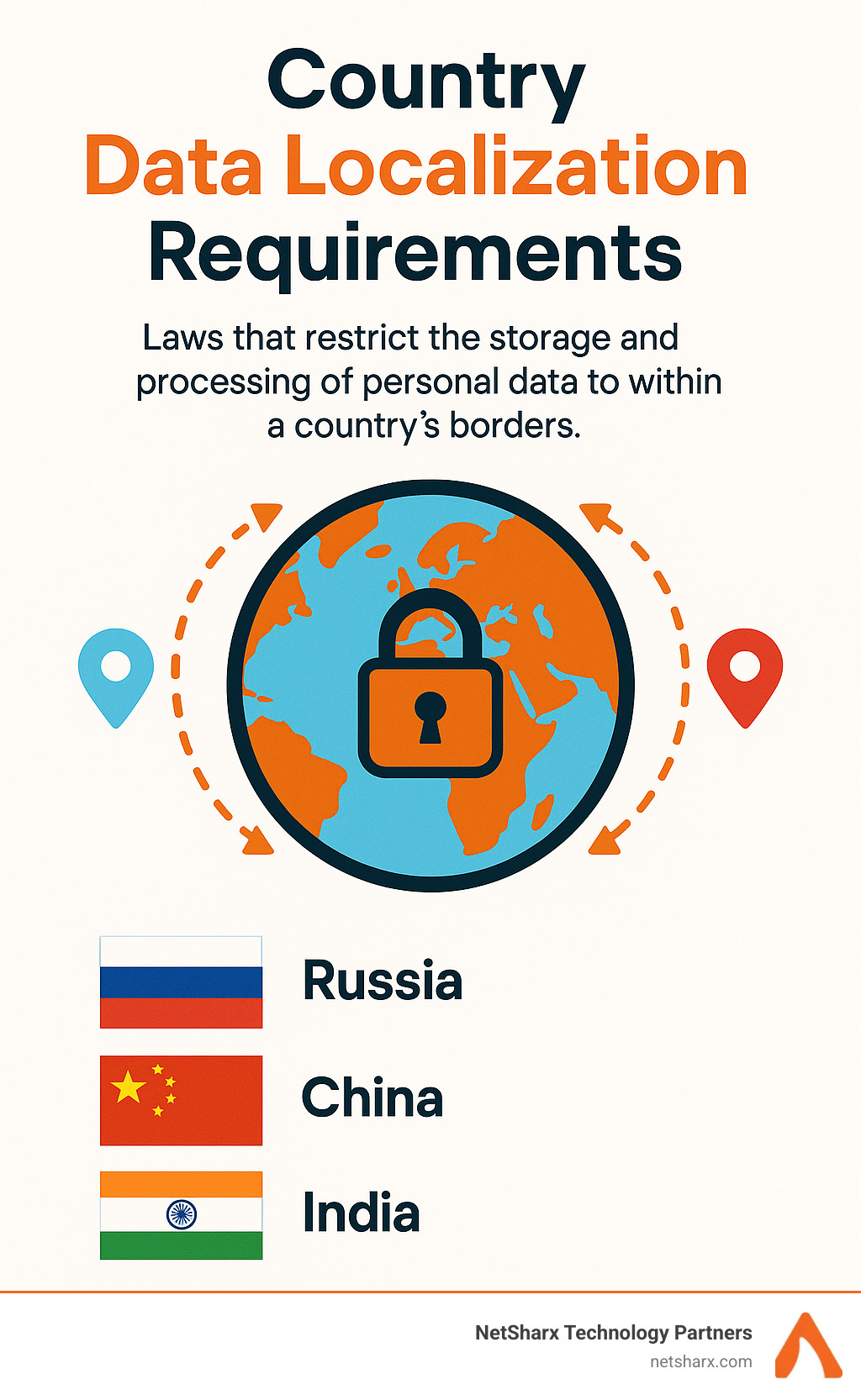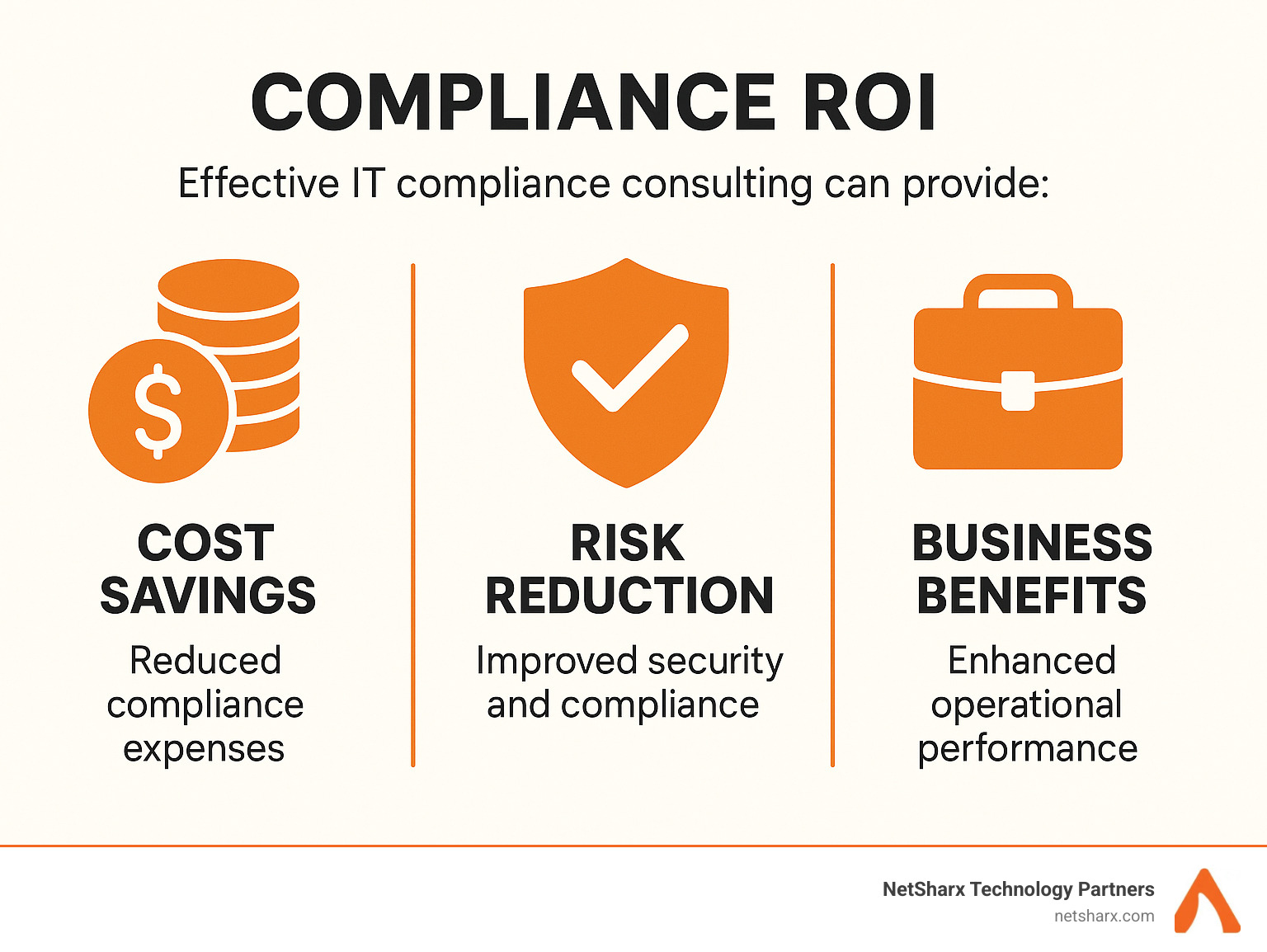It compliance consultant: 7 Powerful Ways to Stay Compliant 2025
Why IT Compliance Has Become Mission-Critical for Modern Businesses
An it compliance consultant is a specialized advisor who helps organizations meet regulatory requirements, implement security frameworks, and maintain audit readiness across their IT infrastructure. These professionals bridge the gap between complex regulations like SOC 2, HIPAA, and GDPR and practical business operations.
What IT Compliance Consultants Do:
- Assess current IT controls against regulatory frameworks
- Identify compliance gaps and security vulnerabilities
- Develop remediation roadmaps and policy documentation
- Prepare organizations for audits and certifications
- Train staff on compliance requirements and best practices
- Monitor ongoing compliance through continuous assessments
Common Engagement Types:
- Pre-audit preparation and gap assessments
- SOC 2, ISO 27001, and PCI-DSS implementations
- HIPAA and GDPR privacy program development
- Virtual CISO (vCISO) advisory services
- Incident response and remediation support
Today’s business landscape demands more from IT leaders than ever before. The shift to remote work, cloud adoption, and AI integration has created new compliance blind spots. Meanwhile, regulatory frameworks continue to multiply – from state privacy laws to sector-specific requirements like CMMC for defense contractors.
The stakes couldn’t be higher. A single compliance failure can result in millions in fines, damaged reputation, and lost business opportunities. According to IBM’s Cost of a Data Breach Report, the average cost of a data breach reached $4.88 million in 2024, making proactive compliance investment essential.
This is where specialized expertise becomes invaluable. Rather than building expensive in-house compliance teams, smart organizations are turning to consultants who bring deep regulatory knowledge, proven methodologies, and cost-effective solutions.
I’m Ryan Carter, founder and CEO of NetSharx Technology Partners, where we’ve helped numerous mid-market and enterprise clients steer complex compliance challenges through our agnostic approach to technology solutions.
What Is an IT Compliance Consultant?
Think of an IT compliance consultant as your organization’s regulatory translator and guide. These specialized professionals take the overwhelming maze of compliance requirements—from NIST frameworks to GDPR regulations—and help you steer through them without losing your sanity or your budget.
At its heart, IT compliance consulting is about making sense of regulatory chaos. Every industry has its own alphabet soup of requirements: SOC 2, HIPAA, PCI-DSS, ISO 27001, CMMC, FedRAMP—the list goes on. An experienced it compliance consultant doesn’t just understand these frameworks; they know how to make them work together in the real world of business operations.
The industries that rely most heavily on compliance expertise include:
Financial services firms wrestling with SEC and FINRA requirements know that regulatory missteps can shut down operations overnight. Healthcare organizations face HIPAA requirements that touch everything from patient data privacy to employee training programs. Government contractors must steer frameworks like CMMC and FedRAMP that can make or break their ability to win contracts. SaaS providers have found that SOC 2 Type II certifications are often deal-breakers for enterprise customers.
Recent industry research reveals that communication skills appear in 45% of compliance consultant job descriptions, making them the most sought-after capability overall. This makes perfect sense—the best it compliance consultant in the world is useless if they can’t explain complex requirements to busy executives and stressed IT teams.
Daily Responsibilities of an IT Compliance Consultant
Risk analysis and assessment work often feels like detective work. Consultants spend hours diving deep into IT environments, following data flows, examining access controls, and uncovering potential vulnerabilities that could derail compliance efforts.
Control testing and validation brings out the skeptical side of consulting. It’s not enough for an organization to have impressive-looking policies—consultants need to prove these controls actually work through reviewing log files, conducting access reviews, and testing backup procedures.
Policy development and documentation represents the most time-intensive aspect of many compliance projects. The best consultants write policies that employees actually follow, not just documents that look good in audit binders.
Staff training and awareness programs separate good consultants from great ones. Effective consultants create training experiences that help people understand why requirements matter, not just what they need to do.
How an IT Compliance Consultant Differs from Security and Risk Advisors
| Aspect | IT Compliance | IT Security | Risk Management |
|---|---|---|---|
| Primary Focus | Regulatory adherence and audit readiness | Threat prevention and incident response | Business risk assessment and mitigation |
| Approach | Regulation-centric, control-based | Threat-centric, defense-focused | Business-impact focused |
| Success Metrics | Audit passes, certification achievements | Incident reduction, threat detection | Risk reduction, business continuity |
| Timeframe | Cyclical (annual audits, renewals) | Continuous monitoring and response | Strategic planning and periodic review |
IT compliance consultants live in a world of frameworks, controls, and audit evidence. Security consultants focus on preventing attacks and responding to incidents. Risk management advisors examine how various risks impact overall business objectives. The most successful compliance programs recognize these complementary strengths and leverage each type of expertise where it provides the greatest value.
Core Regulations & Frameworks Every Consultant Must Master
The world of IT compliance feels like navigating a maze that keeps changing its layout. New regulations pop up regularly, existing frameworks evolve, and IT compliance consultants need to stay on top of it all.
SOC 2 (Service Organization Control 2) has become the gold standard for service providers, especially in the SaaS world. This framework focuses on five trust service criteria: security, availability, processing integrity, confidentiality, and privacy. The difference between Type I and Type II reports matters enormously—Type II proves your controls actually worked over time, typically a full 12 months.
HIPAA (Health Insurance Portability and Accountability Act) requires specific administrative, physical, and technical safeguards for protected health information. The tricky part is that HIPAA applies not just to healthcare providers but to their business associates too.
PCI-DSS (Payment Card Industry Data Security Standard) includes twelve high-level requirements covering everything from network security to employee training. What catches many organizations off guard is the scope creep—if card data touches any part of your network, that entire network segment falls under PCI requirements.
GDPR (General Data Protection Regulation) changed the privacy game worldwide. Even though it’s a European regulation, any company processing personal data of EU residents must comply. Its real teeth come from penalties up to 4% of global annual revenue.
NIST 800-53 serves as the Swiss Army knife of compliance frameworks. This comprehensive catalog provides detailed security and privacy controls that can be custom to different risk levels and organizational needs.
ISO 27001 takes a systematic approach to information security management, emphasizing the management system itself—how you identify risks, implement controls, monitor effectiveness, and continuously improve.
Mapping Controls Across Multiple Standards
Experienced IT compliance consultants really earn their keep by finding sweet spots where different regulations overlap. Instead of building separate control structures for each framework, smart consultants create unified approaches that satisfy multiple requirements simultaneously.
The magic happens through control inheritance and overlap mapping. Many controls serve multiple masters. For example, access control measures you implement for SOC 2 compliance often satisfy corresponding requirements in HIPAA, PCI-DSS, and ISO 27001 with minimal additional effort.
NIST 800-53 emerges as a particularly powerful foundation because its controls map to most other major standards. Organizations can implement a NIST-based control program and then demonstrate compliance with other frameworks through mapping exercises.
Engagement Lifecycle: From Assessment to Remediation
When you partner with an IT compliance consultant, you’re starting on a structured journey that transforms regulatory chaos into manageable, systematic processes.
Phase 1: Scoping and Planning
Everything starts with understanding your world. A skilled consultant will spend considerable time learning about your business model, technology stack, and regulatory landscape. During this phase, consultants conduct stakeholder interviews across different departments and define clear project boundaries.
Phase 2: Current State Assessment
Your consultant becomes a detective, examining your current IT environment with fresh eyes and regulatory expertise. They’ll review everything from network configurations to employee access logs, looking for both strengths and vulnerabilities.
Phase 3: Gap Analysis and Risk Prioritization
Not all compliance gaps are created equal. Smart consultants help you understand these distinctions and focus resources where they’ll have the biggest impact. Risk prioritization considers regulatory severity, business impact, implementation complexity, and resource requirements.
Phase 4: Remediation Roadmap Development
With gaps identified and prioritized, the next step involves creating detailed implementation plans. Effective roadmaps break large compliance projects into manageable phases, identify quick wins, and account for real-world constraints like budget cycles and staff availability.
Phase 5: Implementation Support
Many organizations struggle with the gap between knowing what needs to be done and actually getting it done. The most effective consultants stick around to help with policy drafting, system configuration, employee training, and audit documentation preparation.
Phase 6: Continuous Monitoring and Improvement
Compliance isn’t a destination, it’s a journey. Effective IT compliance consultants help establish ongoing monitoring procedures that catch issues before they become problems through automated reporting systems, periodic control testing, and regular policy reviews.
Assessment & Audit Methodologies
Professional assessment methodologies separate experienced consultants from those just starting out. Skilled IT compliance consultants approach stakeholder interviews like investigative journalists, examine documentation with a critical eye, and use smart sampling and testing strategies that provide reasonable assurance while respecting time and budget constraints.
Remediation & Continuous Improvement
Smart remediation starts with understanding dependencies and constraints. Experienced IT compliance consultants sequence remediation efforts to maximize progress while minimizing disruption. They identify early wins that demonstrate momentum while tackling complex challenges systematically.
Today’s compliance landscape increasingly relies on automated solutions for monitoring, reporting, and evidence collection. However, automation isn’t magic—tools must be properly configured, regularly maintained, and integrated with existing systems.
Skills, Career Paths & Cost Models
The world of IT compliance consulting attracts professionals from diverse backgrounds, but success requires a specific blend of technical know-how, regulatory expertise, and people skills.
The Technical Foundation
Every effective IT compliance consultant needs solid technical grounding spanning IT infrastructure, cloud computing, database management, and emerging technologies. But you don’t need to be a coding wizard—the technical knowledge serves as a foundation for understanding how business processes interact with technology systems.
Communication: The Make-or-Break Skill
Communication skills appear in 45% of compliance consultant job postings—more than any technical requirement. Effective consultants translate complex regulatory requirements into actionable business language and build consensus around remediation priorities.
Professional Certifications That Matter
The most respected credentials include CISM (Certified Information Security Manager) for security management, CISSP (Certified Information Systems Security Professional) for comprehensive security knowledge, and CISA (Certified Information Systems Auditor) for audit expertise. ISO 27001 Lead Implementer/Auditor certifications provide specialized knowledge for organizations pursuing ISO compliance.
Typical Engagement Models and Pricing
Hourly Advisory rates typically range from $150 to $400 per hour, depending on consultant experience and engagement complexity. This model works well for initial assessments and ongoing advisory support.
Fixed-Fee Projects work best for well-defined deliverables like SOC 2 implementations or policy development projects. These engagements provide cost predictability while allowing consultants to leverage efficiency gains.
Managed Service Retainers typically range from $5,000 to $25,000 monthly, providing dedicated consultant time for continuous monitoring and advisory services. This model creates predictable costs while ensuring consistent consultant availability.
Virtual CISO Arrangements combine strategic guidance with hands-on implementation support, providing senior-level security and compliance leadership without full-time employment costs.
Career Roadmap to Become an IT Compliance Consultant
Most successful consultants begin with bachelor’s degrees in information technology, computer science, accounting, or business administration. Entry-level positions like Compliance Analyst or Internal Auditor provide crucial exposure to compliance requirements and audit processes.
Professional development typically follows a logical progression: Years 1-3 focus on foundational certifications like Security+ that establish basic security knowledge. Years 3-7 involve pursuing specialized certifications like CISA or CISM that demonstrate deeper expertise. Years 7 and beyond focus on advanced certifications and thought leadership activities.
Trends, Challenges & Best-Practice Tips for 2025
The world of IT compliance consulting is shifting faster than ever before. What worked in 2023 might be obsolete by next year, and understanding these emerging trends is essential for both organizations and consultants.
AI Governance Becomes the Wild West
Artificial intelligence has moved from boardroom buzzword to business-critical tool practically overnight. Organizations are desperately seeking guidance on AI governance, algorithmic bias prevention, and automated decision-making oversight. Traditional compliance frameworks weren’t designed to handle systems that learn and change their behavior over time.
Data Localization Creates a Global Puzzle
Countries around the world are implementing data localization requirements that restrict where personal information can be stored and processed. For multinational organizations, this creates a compliance nightmare requiring separate data centers, complex routing systems, and different privacy procedures depending on customer location.
Remote Work Breaks Traditional Compliance Models
The pandemic permanently changed how we work, but compliance frameworks are still catching up. Traditional security models assumed controlled office environments—remote work throws all those assumptions out the window. Organizations need new approaches for maintaining compliance when employees work from coffee shops and home offices worldwide.
Supply Chain Security Becomes Everyone’s Problem
High-profile attacks like SolarWinds have made supply chain security a boardroom priority. New regulations require comprehensive supply chain risk management programs, creating opportunities for consultants who understand third-party risk assessment and vendor security evaluation.
The Talent Crisis Creates Opportunities
The compliance consulting field faces significant talent shortages, particularly for professionals with both technical depth and regulatory expertise. This creates unprecedented opportunities for qualified consultants while organizations struggle to find needed expertise.
When Should You Hire an IT Compliance Consultant or vCISO?
Timing is everything when it comes to engaging compliance expertise. The key is recognizing warning signs that indicate external expertise will provide real value.
Startup Scaling Hits Compliance Walls
Fast-growing companies often hit compliance requirements like a brick wall. One day you’re focused on product development, the next day enterprise customers are demanding SOC 2 reports. An experienced IT compliance consultant can establish foundational programs quickly while your team focuses on core business activities.
Pre-Audit Preparation
Organizations pursuing certifications often find their internal controls aren’t as robust as assumed. Smart organizations engage consultants months before audit dates to conduct gap analyses and implement necessary controls.
Incident Response Demands Immediate Expertise
Security incidents create urgent needs for specialized expertise. Organizations need immediate help assessing impacts, implementing corrective actions, and managing regulatory notifications with their varying timelines and requirements.
Resource Constraints Make Flexibility Valuable
Many organizations lack sufficient internal resources for complex compliance requirements. Consultants provide flexible access to expertise without long-term commitments, scaling support based on current needs.
Frequently Asked Questions about IT Compliance Consultants
What certifications are most valued?
CISA (Certified Information Systems Auditor) stands out as perhaps the most directly relevant certification for compliance consulting work. This credential focuses specifically on audit processes and control assessment methodologies that form the backbone of compliance engagements.
CISM (Certified Information Security Manager) appeals particularly to consultants who work at the strategic level with executives and board members, focusing on governance, risk management, and program development.
CISSP (Certified Information Systems Security Professional) provides the broadest foundation across eight security domains. While not compliance-specific, this certification demonstrates comprehensive security knowledge that underpins most regulatory frameworks.
Framework-specific certifications like ISO 27001 Lead Implementer become increasingly valuable as consultants specialize. If your organization needs ISO 27001 certification, working with a consultant who holds the Lead Implementer credential can significantly accelerate your timeline.
How long does a typical compliance project take?
Initial gap assessments typically require 2-6 weeks for comprehensive evaluations. SOC 2 Type I implementations generally take 3-6 months from initial assessment through audit completion. SOC 2 Type II certifications require 12-18 months total because auditors must observe control operations over a full year.
ISO 27001 implementations typically span 6-12 months for initial certification, while HIPAA compliance programs usually require 4-8 months for comprehensive privacy and security program development. PCI-DSS compliance timelines vary dramatically based on current security posture, ranging from 3-9 months.
Several factors consistently influence project timelines: organizational size and complexity, stakeholder engagement, and existing control maturity. Projects move faster when organizations assign dedicated resources and maintain strong executive sponsorship.
Can consultants guarantee audit “pass” results?
Ethical consultants cannot and should not guarantee specific audit outcomes. Auditor independence represents the fundamental reason why outcome guarantees are impossible—external auditors maintain their own professional standards and make independent assessments.
What reputable consultants can provide instead includes comprehensive gap assessments, detailed remediation roadmaps, implementation guidance based on proven best practices, and mock audit exercises that simulate real audit conditions.
Be wary of consultants who promise guaranteed audit outcomes. Such promises often indicate either inexperience with the audit process or willingness to compromise professional standards. Instead, look for consultants who demonstrate deep understanding of audit processes and focus on building sustainable compliance capabilities.
Conclusion
The world of IT compliance consulting continues to evolve at breakneck speed, but one thing remains clear: organizations can no longer afford to wing it when it comes to regulatory requirements. The stakes are simply too high, and the landscape too complex for anything less than professional expertise.
IT compliance consultants serve as essential bridges between the bewildering world of regulatory frameworks and the practical realities of running a business. These professionals don’t just help you check boxes—they transform what often feels like an overwhelming burden into a strategic advantage that actually strengthens your organization.
The numbers tell the story. With compliance failures leading to millions in fines and damaged reputations, the investment in professional guidance pays for itself many times over. Organizations that get ahead of emerging trends like AI governance, data localization laws, and remote work compliance challenges with the right consulting support will find themselves at significant competitive advantages.
The sweet spot for engaging compliance consulting typically emerges when you’re pursuing major certifications like SOC 2 or ISO 27001, preparing for high-stakes audits, or responding to security incidents with compliance implications. The beauty of working with experienced consultants lies in their ability to see patterns across industries and regulations while your organization tackles frameworks for the first time.
At NetSharx Technology Partners, we’ve witnessed how the right compliance expertise transforms organizational cultures. Companies that initially approached compliance as a necessary evil often find that strong governance frameworks actually improve their operational efficiency, customer relationships, and competitive positioning.
Our agnostic approach means we focus on understanding your unique compliance challenges and connecting you with the expertise and solutions that actually fit your situation. This unbiased methodology has helped numerous organizations avoid costly missteps while building sustainable compliance programs that grow with their businesses.
Looking ahead, the organizations that thrive will be those that view compliance not as a burden to be minimized, but as a foundation for trust, growth, and competitive differentiation. Whether you’re a startup hitting your first major compliance milestone or an established company facing new regulatory requirements, you don’t have to figure it out alone.
The path forward starts with honest assessment of where you stand today and clear vision of where you need to be tomorrow. Learn more about our cybersecurity services and find how we can support your compliance journey with the unbiased guidance and comprehensive support that makes all the difference.
Compliance done right isn’t just about avoiding penalties—it’s about building the kind of organization that customers trust, partners respect, and regulators view as a model for others to follow. That’s the real ROI of professional compliance consulting, and it’s an investment that keeps paying dividends long after the initial engagement ends.

